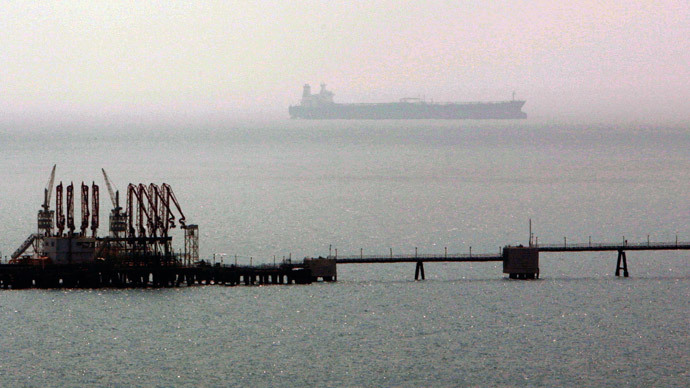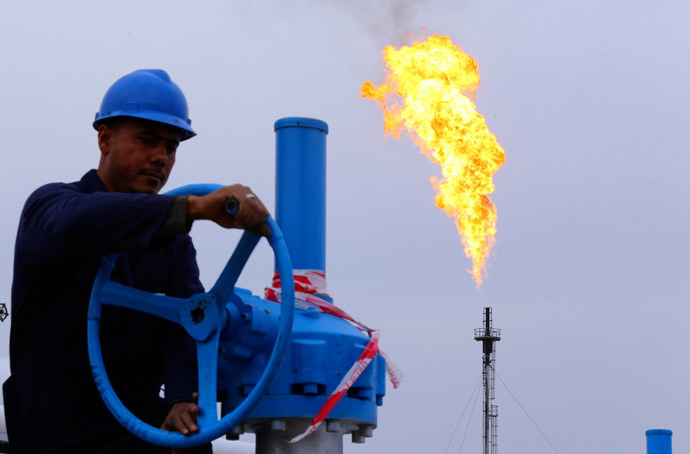Geo-political posturing and pipeline politics: Turkey as an energy hub

After a decade of AKP rule, under the popular yet divisive leadership of Recep Tayyip Erdogan, Turkey has finally become an important regional player in the Middle East and Europe.
The past decade has seen amazing growth in economic terms and this booming economy necessarily led to greater political clout – a situation relished by Tayyip Erdogan, who has been acting accordingly ever since. His moment in the sun at Davos five years ago, when he defiantly walked out on Israel's President Shimon Peres, launched him into the global limelight, turning him into a hero for many disenfranchised Muslims worldwide and transforming him into a global leader of some import. But is the Turkish economic miracle, constituting the base of this new political power, a reality or merely a chimera?
Over the past ten years, Turkey has enjoyed an average economic growth rate of 5.2 percent a year, a trend which started to waver in 2011 according to Fadi Hakura, Turkey analyst at the London-based think tank, Chatham House. In fact, the economic boom was built with the income provided by the ruthless privatization program instituted by the AKP government. Speaking on the radio station Voice of Russia recently, Hakura explained that the AKP-led privatizing drive was a "revenue maximizing privatization," making large amounts of cash readily available to invest in all kinds of profitable ventures, particularly property development and real estate.
The Turkish economy nearly quadrupled in size, an incredible growth rate realized on account of an "epic boom in consumption and construction that led to the building of countless malls, skyscrapers, and ambitious infrastructure projects," as expressed by the eerily prescient Jesse Colombo. Will this boom now lead to a necessary bust? One cannot but notice that the inventory of unsold housing units currently stands at about 1.5 million, a list that was "close to zero several years ago" and Colombo talks of "Turkey's Bubble Economy."
As a result, Turkey's leaders are now scrambling for alternative sources of income, as the state has nearly run out of products to sell. And in this context, Turkey's unique location readily springs to attention. Situated right next to the hydrocarbon oasis that is the Arab (and Iranian) Middle East, Turkey is now trying to capitalize on its share in Pipelineistan to turn itself into a veritable energy hub on the crossroads between East and West. In this respect, Turkey's development of close ties with northern Iraq's KRG (or Kurdish Regional Government) appears crucial.
Hard alternatives
In an earlier piece, I alluded to the happy confluence of Turkey's domestic policy towards its native Kurdish minority in the South-East of the country and the AKP's overtures towards Nechervan Barzani, the KRG's prime minister, and the subsequent lucrative oil deal. Since December last year, the KRG has been transporting its oil into Turkish territory, about 100,000 barrels a day. Once received by the Turkish side in the oil terminal of Ceyhan, the oil was stored locally. But now the terminal's depots are close to overflowing. Given the Bush invasion of Iraq, and US interests in the region, Washington has in the past repeatedly criticized Ankara for excluding Iraq's central government in Baghdad in any energy cooperation with Erbil. In effect, compounding matters, Turkey has now unilaterally decided to start selling the stored Iraqi (or should that be, Kurdish) oil on the international market.
On Friday, May 23, 2014, the Baghdad government protested against Turkey's willingness to sell the oil originating from the KRG, claiming that such a sale would be counter to international law as well as being in violation of the Iraqi constitution. An official from the Turkish Ministry of Energy then declared that "Turkey will continue to sell the Kurdish oil in accordance with international and Iraqi laws. The oil will not be sold with long-term agreements but with monthly tenders, because Turkey and [the] KRG want to assure all parties interested in the sale about the amount of the exported oil."

As Baghdad is clearly afraid of losing a substantial share of the accruing revenue, the Turkish government stated that the KRG as well as Iraq's central government had both been duly notified, adding that "Turkey guarantees the revenue will be shared in a way which is dictated by the Iraqi constitution." In this way, Turkey is clearly attempting to persuade Iraq that its territorial integrity is of grave concern to the AKP, particularly in view of the fact that a fully independent KRG would constitute a dangerous precedent that could move Turkey's Kurds towards their own demands for autonomy, or even independence. Nevertheless, the Baghdad government filed for arbitration against Ankara at the Paris-based International Chamber of Commerce. The Iraqi government, headed by President Jalal Talabani and Prime Minister Nouri al-Maliki, issued the following statement: "By transporting and storing crude oil from Kurdistan [or the KRG], and by loading that crude oil onto a tanker in Ceyhan, all without the authorization of the Iraqi Ministry of Oil, Turkey and BOTAS [Turkish Petroleum Pipeline Corporation] have breached their obligations under the Iraq-Turkey Pipeline Agreement."
Sharer’s problem
Speaking on Sunday, May 25, Turkey's Minister of Energy and Natural Resource Taner Yıldız maintained that "the oil and revenue belong to Iraq. The revenue gathered in [the Turkish state-owned] Halkbank will be equally shared. In this sense, what will be done is in parallel with what our Iraqi people decide. That is why we cannot have any deeds against agreements. We believe that there is and will be nothing contradicting the agreement." The Minister clearly wants the oil sales to proceed, as income must be generated for Turkey. On May 22, 1 million barrels of Kurdish (or Iraqi) oil were sold to German and Italian refineries, in spite of Washington and Baghdad making loud disapproving noises. Thus, Turkey appears to be forging ahead, determined to become a veritable and highly profitable "energy hub on the crossroads between East and West."
Turkish officials must be licking their fingers at the prospect of being able to sell Iraq's oil, emanating either from territories controlled by Erbil or from fields run by Baghdad, possibly remembering then-US Deputy Defense Secretary Paul Wolfowitz and his 2003 announcement that Iraq is a "country [that] swims on a sea of oil." The International Energy Agency (IEA) famously predicted some time ago that Iraqi oil production would double by 2020, a sentiment echoed by the International Monetary Fund (IMF), actually saying that Iraq could expect nearly $5 trillion in revenues from oil exports before 2035. These optimistic assessments probably go a long way towards strengthening Turkey's resolve to be the preferred conduit for the regional branch of Pipelineistan.
In fact, looking for other means of procuring much-needed revenue now that the privatization bubble is about to burst, Ankara has set its sights on Turkmenistan, the "sixth largest natural gas reserve holder in the world" with proven stocks of approximately 265 trillion cubic feet (Tcf), as announced by the IEA. At the moment, Turkmenistan primarily exports its natural gas to China (about 20 billion cubic meters (bcm) annually according to the news agency Reuters), Russia, Iran and other Central Asian nations; but selling Turkmen gas to Europe via Turkey would seem like an option that would be very favorably received in Brussels as well as in Ankara. This would involve pipelines crossing the Caspian Sea into Azerbaijan, and then onwards via Georgia to Turkey – a route similar to the 1,768 kilometer Baku-Tbilisi-Ceyhan (BTC) pipeline inaugurated in 2005. And with this prospect in mind, Turkey's wily foreign policy chief, Ahmet Davutoğlu, went to Azerbaijan's capital of Baku on Monday, May 26. The foreign ministers of Turkey, Azerbaijan (Elmar Mammadyarov in charge of Azeri foreign affairs since 2004), and Turkmenistan (Raşit Meredow taking care of Turkmenistan's external relations since 2001) held a meeting there to discuss matters of interest, particularly the construction of a trans-Caspian pipeline, the first requirement for realizing gas exports to Europe. As such, this tripartite meeting comes on the heels of an announcement made in November last year, when the head of the EU mission in Ashgabat, Denis Daniilidis, told an oil and gas conference in the Turkmen capital that negotiations for a project to pump Turkmen gas towards Europe were already underway.
The EU is thus trying to utilize Turkey in its attempts to lessen its dependency on Russian gas imports. But Turkey, on the other hand, is more than determined to achieve its own goals irrespective of European or other objections, and is in that respect not afraid to come to an understanding with Russia. In view of the current crisis in the Ukraine, Russia's Vladimir Putin recently declared that Gazprom would probably choose a non-EU member to realize the $20 billion South Stream pipeline project. As the trouble with Ukraine really seems to have started with the EU and NATO’s attempts to lure Kiev into its own web, thereby lessening Russia's energy hold on the European block, Putin's decision to relinquish the Bulgarian and Greek route seems understandable and that the alternative could instead be Turkey appears equally reasonable – particularly, now that the European Parliament even passed a non-binding resolution calling for the South Stream’s cancellation last April. In an apparent exercise to sow confusion, the EU Energy Commissioner Guenther Oettinger recently said on the record that the South Stream pipeline "is not a problem for me. We don’t want to block it, but it does not have priority either." At the moment, the so-called Blue Stream pipeline under the Black Sea supplies Turkey with Russian gas (after all. Turkey's own gas needs are met by Russia and, to a lesser extent, Iran). Sergey Glebov, a professor of international relations at the Odessa Mechnikov National University in Ukraine, opined that "it looks like Turkey and Russia may expand the capacity of the Blue Stream, or build a parallel pipeline to the coast of Turkey." As such, Gazprom's Deputy Chairman Alexander Medvedev visited Turkey on April 22 and met with Energy Minister Taner Yıldız. Subsequently, Yıldız told the Turkish press that they discussed a new route for the South Stream pipeline, a way that would guarantee Europe's future energy security.
At the same time, Turkey's own energy needs should not be discounted either, as the country spends about $60 billion annually importing oil and gas, primarily from Russia and Iran. And in this context, it is interesting to note that Iranian President Hassan Rouhani is set to visit Turkey on June 9, 2014, when negotiations will be undertaken in an attempt by Turkey to lower the price of gas. Arguably, Turkey will now have a stronger bargaining position as a result of its new rapprochement to the Gazprom Nation. In the end, it seems that, what I earlier termed, Turkey's pseudo-Ottoman policy of attempting to integrate the "erstwhile Ottoman hinterland into the mainstream of Turkish politics today" by means of strong commercial and economic ties and interactions, will now also guide Turkey on its way to become an "energy hub on the crossroads between East and West," uniting Iraq, Azerbaijan, Turkmenistan, Russia, and Europe in the process.
The statements, views and opinions expressed in this column are solely those of the author and do not necessarily represent those of RT.
The statements, views and opinions expressed in this column are solely those of the author and do not necessarily represent those of RT.













